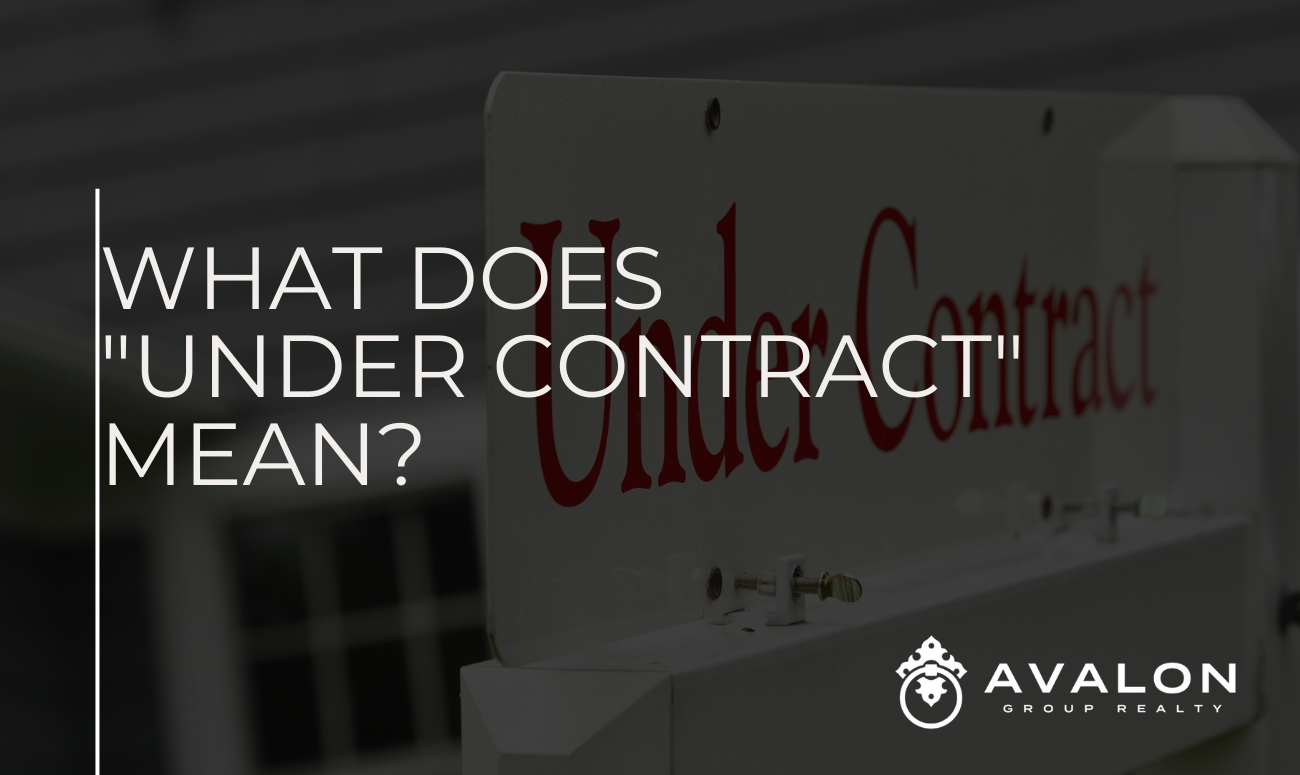What Does “Under Contract” Mean? Understanding “Under Contract” Listing Status in Real Estate
When browsing real estate listings, you’ve likely come across properties labeled as “under contract.” So what does this term mean, and what are the implications if you’re interested in making an offer? This guide breaks it all down.
The Basics
A property that is under contract means:
– A purchase offer has been made and accepted by the seller
– Both parties have a signed an agreement outlining the sale terms
– The contingencies in the contract must be met before closing
Essentially, under contract signifies that someone intends to buy the home, but the sale is not yet final. The property will usually remain under contract until closing, which is when ownership officially transfers.
Between Contract and Closing
After an offer gets accepted, the listing agent changes the status to under contract in the multiple listing service (MLS). Most sellers will stop actively marketing the home at this point.
However, the transaction is never guaranteed until closing. Many things can still fall through during this period:
– Home inspection issues – Problems with the property’s structure or systems could arise that the buyer and seller can’t agree how to address.
– Appraisal contingencies – If the appraised value comes under the contract price, the buyer may want to renegotiate or walk away.
– Financing issues – Even buyers who got preapproved can have their mortgage denied by the underwriter.
On average, about 4% of under contract sales end up falling through nationally. But there’s still a decent chance the deal completes.
Contingent vs. Pending Status
In real estate lingo, a contingent or pending status usually means the same thing as under contract. However, there are some subtle differences:
– Contingent specifically refers to major conditions in the contract that haven’t yet cleared, like financing and inspection contingencies.
– Pending means the property has passed inspection and appraisal but still awaits closing procedures and paperwork.
So a pending listing has technically cleared its main hurdles but could still fall through. Under contract and contingent tend to get used interchangeably by most agents up until the pending stage.
What Does “Under Contract” Mean? Can You Still Make an Offer?
Backup Contracts
Although the odds are slim, under contract sales can and do fall apart on occasion. This leaves an opportunity for a backup buyer to swoop in.
If you find a home you love that’s under contract, ask your agent to reach out to the listing agent. They can gauge if the seller might accept a backup contract. The first buyer would need to terminate their contract before the seller can move forward with another party. But it never hurts to get your foot in the door just in case.
Be aware that backup offers will likely need to come in at or above list price, especially in competitive markets. You want your contract to give the seller no reason to hesitate if the current deal falls through. Come in low, and they may just opt to go back on the open market.
When reviewing under contract listings, pay attention to:
– How long it’s been pending – The longer without closing, the more likely issues exist.
– If contingencies have cleared – Pending status means the major hurdles are done.
– Motivation level of sellers – Ask your agent if they seem anxious enough to accept a strong backup.
What About Investors or Flippers?
Investors and flippers often buy properties in poor condition to rehab and resell for profit. They may be more inclined than traditional sellers to accept backup offers or entertain reselling a house they just purchased.
Why? Because they tend to care more about the bottom line than sentimental reasons for choosing one buyer over another. To an investor, a profitable sale is a profitable sale.
But this route does come with complications. There may be tighter timeframes if backup buyers want to see the home or conduct inspections. And investors likely won’t make repairs or negotiate much on price.
Closing the Deal
If you end up as the lucky backup buyer, be prepared to move quickly once the initial contract gets terminated. Have your financing ready and earnest money available for immediate transfer.
In many cases, investors and flippers will expect you to match the original closing date. This means less time for contingencies and delays on your end. Know in advance what repairs or components concern you so inspection negotiations go smoothly.
When Under Contract Becomes Sold
Eventually, most under contract homes do make it to the closing table after:
– Contingencies get fulfilled
– Final walkthroughs complete
– Paperwork and funds change hands
Once closed, the listing agent will change the MLS status from pending to sold. At this point, the home belongs to the new owners, and the transaction journey has ended.
Other Common Listing Statuses
If you don’t see “under contract” on a listing you like, look out for these related terms:
- Pending – As mentioned, this typically means the major contingencies have cleared, and the home is nearing closing.
- Contingent or contingencies – Indicates there are still outstanding conditions in the sales contract that need fulfilling before closing.
- Active under contract – The seller has an accepted offer but wants backup bids just in case.
- Backup offers – Not an official status but signals the sellers hope for a Plan B offer.
Outside of under contract variants, common listing statuses include:
- Active – The home is still openly marketed and has no offer yet.
- Off market or coming soon – The seller plans to list the home but hasn’t made it officially active yet.
- Expired – A temporary status when an active listing didn’t sell before the contract period ran out.
- Canceled or withdrawn – The seller took the home off the market for personal reasons.
- Sold – The property has closed and changed ownership.
When an Under Contract Sale Falls Through
There’s always a chance even a pending deal can fall apart unexpectedly. Common reasons include:
- The buyer’s financing gets denied at the last minute.
- Major issues arise on a final inspection that no one can compromise on.
- An involved party passes away, leading to complications with inheritors.
- The buyer simply gets cold feet and walks away, losing their earnest money.
Even at the closing table, technical problems around liens, improperly filed documents, and legal snags could torpedo a seemingly done deal.
Strategies for Buying Under Contract Properties
If you have your sights set on making an offer on a house that’s under contract, proceed strategically so your bid stands out.
Get Clarity on the Current Deal
First and foremost, before taking any action, have your agent find out intel about the current sale. Key questions to ask that can reveal if there are any major red flags with the current deal or buyers:
- How long has it been under contract?
- What contingencies remain open that signal potential issues down the line?
- Does the seller seem motivated enough to accept backups should things go south?
- Are there any factors that signal the current buyers seem unreliable or high-risk?
Data and insights uncovered can reveal if the seller has compelling reasons to welcome a second option or backup offer as a safety net.
Provide a Compelling Offer
Subsequently, make sure your offer incentivizes the seller to take it seriously as a backup. Ways to achieve this include:
- Offering at or slightly above list price
- Keeping contingencies light or tying them to short timeframes
- Putting down sizable earnest money to demonstrate commitment
- Attaching a preapproval letter from your lender to prove quick financing ability
Making things easy for the sellers and removing obstacles that could delay a sudden buyer switch goes a long way.
Highlight Unique Selling Points
Additionally, if you’re competing against other backup offers, find ways in your proposal to stand out as favorable:
- Mention flexibility around closing dates
- Emphasize how you don’t have the encumbrance of needing to sell another home first
- Share your background if relevant, like all-cash investors willing to take on home rehabs
Anything proving you’re reliable, qualified, and able to act quickly helps entice stressed sellers facing a failed deal.
But also balance eagerness with reason so you don’t overextend yourself or waive critical contingencies. Don’t let desperation undermine proper due diligence.
Be Ready to Act Fast!
At the end of the day, if that call comes from your agent that the property’s suddenly back on the market, immediately:
- Confirm your financing terms are still optimal with lenders
- Line up your home inspector ASAP to visit
- Clear your schedule rapidly for signing paperwork
Success boils down to promptly addressing contingencies while keeping cool under pressure. Sellers will pick the flexible, drama-free buyers ready to smooth out any last-minute issues that pop up.
Under Contract Speed in Tampa Bay
The Tampa and St. Petersburg real estate markets are sizzling hot. Homes are frequently getting snatched up within days of hitting the MLS.
According to the St. Pete Area Association of Realtors, in January 2023:
- St. Pete homes spent an average of just 15 days on the market before going under contract
- Nearly 60% of listings entered a pending status in less than one month
Additionally, 22% of newly listed homes in St. Pete went under contract within just one week. This red-hot demand means buyers need to act practically instantaneously to land a house.
Over in Tampa, Zillow data shows homes getting contracted even faster in late 2022:
- Half of Tampa listings went pending in 6 days or less
- The bottom quarter of fastest-moving homes took merely 4 days to enter contract
With frenzied buyers pouncing almost immediately, just a single open house can spark bidding wars in the area.
So if you have your eye on an under contract home in the Tampa or St. Pete zone, be ready to pull the trigger. Timing and speed are everything for both primary and backup offers nowadays.
The moment that sign flips from pending back to active, you’ll need to aggressively pursue within hours or risk losing out yet again. There’s simply no time in this ultra-competitive market!
So stay alert and agile in hot pursuit of an under contract property, but brace for possible disappointment too. Persistence and preparation pay off for lucky backup buyers who get unexpectedly rewarded!
If you’re waiting in the wings with a backup contract, be ready to act instantly if you get word the original contract terminated. Be prepared to negotiate, make compromises, and move fast so you don’t lose out on the property twice!
If you are looking for a Realtor St Petersburg Fl visit https://avalongrouptampabay.com/




